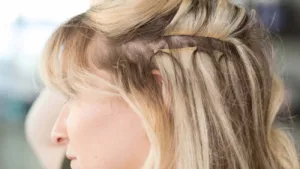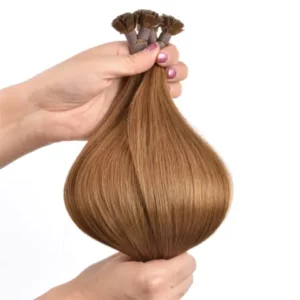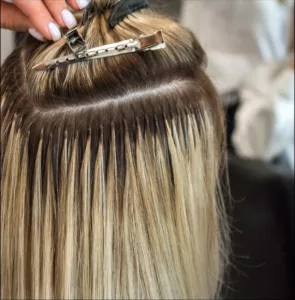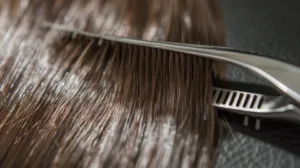Fusion hair extensions deliver some of the most natural, long-lasting results—but only if they’re cared for properly.
To maintain fusion hair extensions, you must follow specific routines for both hot fusion and cold fusion methods. Proper washing, conditioning, brushing, and bedtime care all matter. Small mistakes can shorten their lifespan or even damage natural hair.

Want to make sure your client’s investment lasts? Here’s everything U need to know.
What Are Fusion Hair Extensions?
Fusion extensions are installed strand by strand, offering maximum flexibility and a seamless finish. But not all fusion types are the same.
Fusion hair extensions are semi-permanent strands bonded to the natural hair. They come in two main types: hot fusion and cold fusion.
Hot Fusion Extensions
Hot fusion uses heat to melt keratin tips and bond them to natural hair. Common types include:
- U Tip: Classic hot fusion shape; flat keratin base
- V Tip: More pointed keratin for precision installs
- Flat Tip: Combines tape and fusion in structure
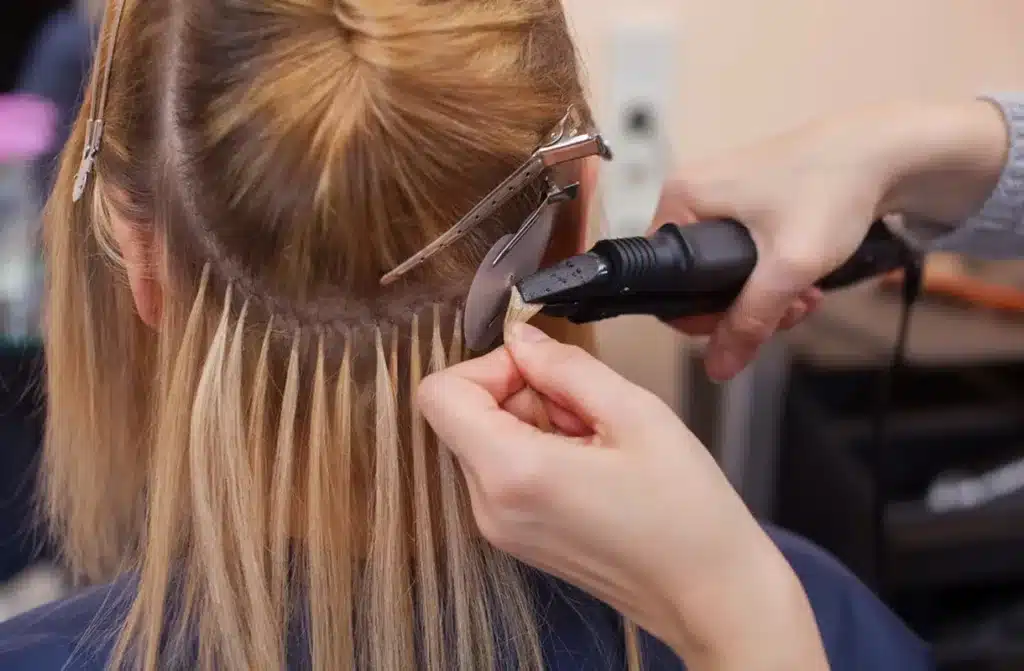
Cold Fusion Extensions
Cold fusion methods do not use heat. Instead, they involve mechanical tools or adhesives:
- I Tip: Installed with beads or rings
- Nano Tip: Smaller version of I tip, for fine hair
- Plastic Tip / F Tip: Soft plastic top that inserts into microbeads

Key Differences
| Feature | Hot Fusion | Cold Fusion |
|---|---|---|
| Installation | Heat-based | Beads or mechanical |
| Tools | Fusion iron | Pulling hook, pliers |
| Reusability | Often non-reusable | Often reusable |
| Duration | 2–3 months | 2–3 months |
| Best for | Long-term wear, smooth blend | Thin or heat-sensitive hair |
Installation Summary
- Hot Fusion: Heat tool melts keratin. Technician rolls and secures each strand manually.
- Cold Fusion: Strand is threaded through a bead. Bead is clamped shut. No heat needed.
How to Take Care of Fusion Hair Extensions?
Proper care keeps the bonds secure, the strands healthy, and the look flawless. But hot and cold fusion each have unique needs.
Different Priorities for Hot vs Cold Fusion
- Hot Fusion:
- Avoid heat tools near the bond
- Be extra gentle during brushing to avoid snapping keratin tips
- Bonds can dry out—deep conditioning is important
- Cold Fusion:
- Beads may slip—tension during brushing must be soft
- Avoid pulling or tight styles near the scalp
- Do not squeeze beads once installed—they crack
Shared Daily Maintenance Steps
Follow these steps for both types to extend the life of the extensions:
Washing
- Use sulfate-free shampoo
- Apply shampoo to scalp only
- Let shampoo rinse over extensions without rubbing
- Condition mid-lengths to ends only
Drying
- Gently squeeze out water—do not twist
- Air dry when possible
- Blow dry on low heat using a round brush
Brushing
- Always hold the root with one hand to support
- Use a loop brush or extension-safe paddle brush
- Start from ends, work upward
Bedtime
- Braid hair in one or two loose braids
- Sleep on silk or satin pillowcases
- Never sleep with wet hair
| Step | Product Needed | Notes |
|---|---|---|
| Shampoo | Sulfate-free | Focus on scalp only |
| Conditioner | Moisturizing, silicone-free | Mid-shaft to ends only |
| Styling Tool | Extension-safe brush | Never tug near bond |
| Sleep Care | Silk pillow or bonnet | Prevents friction and matting |
With care, both hot and cold fusion extensions can last 2–3 months per install—and full cuticle hair can be reused several times if treated correctly.

My Opinion
After working with thousands of professional stylists and wholesalers, I can say this: fusion extensions are not just about the install—they’re about the discipline that comes afterward.
Hot fusion gives a cleaner, more natural flow. Cold fusion offers flexibility and reusability. But in both cases, hair quality and client care habits decide the outcome.
If you’re using full cuticle hair from a factory like ours, the difference is even more noticeable. The bonds hold better, the texture lasts longer, and the feedback from clients is always more positive.
Extensions are a service—but care is what creates loyalty.
FAQ
Q: How often should I wash fusion extensions?
A: Ideally 1–2 times per week using sulfate-free shampoo. Over-washing can weaken the bonds.
Q: Can I color fusion hair extensions?
A: If you’re using full cuticle, single-donor hair, yes. Always color before installation or consult a stylist for strand testing.
Q: Do fusion extensions damage natural hair?
A: Not when installed and maintained properly. Damage usually comes from incorrect removal or improper aftercare.
Q: Can I swim with fusion extensions?
A: Yes, but wear a protective cap. Rinse immediately after and never let chlorine or salt water sit on the bonds.
Q: How long do hot fusion extensions last?
A: 2–3 months per install. With full cuticle hair, the strands can be re-tipped and reused.
Q: Can I style my hair with heat tools?
A: Yes, but avoid applying direct heat to the bond. Always use a heat protectant spray.
Q: What brush is best for fusion extensions?
A: A loop brush or boar bristle paddle brush designed for extensions. Avoid brushes with metal pins.
Q: Why are my beads slipping in cold fusion?
A: It could be due to incorrect installation, oily scalp, or using conditioner too close to the roots.
Q: How do I sleep with fusion hair?
A: Always braid the hair and use a silk pillowcase. This prevents friction and keeps the bonds from loosening.
Q: Can I use dry shampoo?
A: Yes, but apply only at the roots and avoid letting powder build up on the bonds.

Conclusion
To get the most from fusion hair extensions, U must treat them with the same care as natural hair—plus a little extra. The better the care, the longer the beauty lasts.
where to buy Fusion Hair Extensions
Hibiscus Hair Manufacturer has been dedicated to producing high-quality Fusion Hair Extensions hair extensions for 25 years and is a recognized leader in the industry. If you are interested in finding a reliable hair extensions supplier and wholesale for your brand, please visit our website for more information:
KERATIN HAIR

